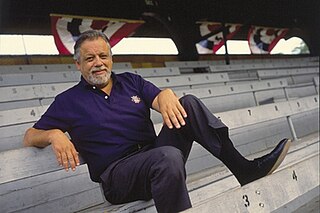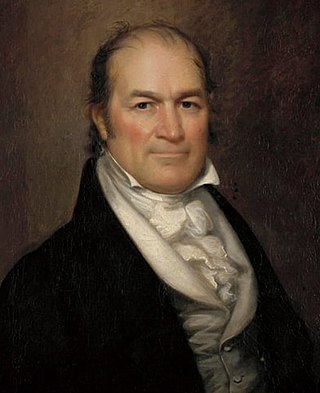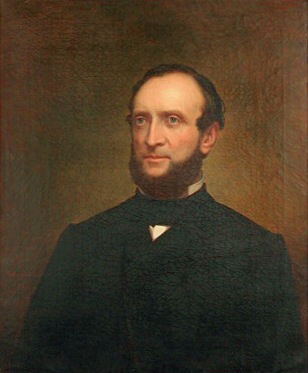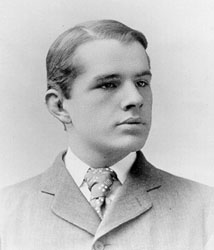Related Research Articles

Angelo Bartlett "Bart" Giamatti was an American professor of English Renaissance literature, the president of Yale University, and the seventh commissioner of Major League Baseball.

William Harris Crawford was an American politician and judge during the early 19th century. He served as US Secretary of War and US Secretary of the Treasury before he ran for US president in the 1824 election.

Daniel Coit "D. C." Gilman was an American educator and academic. Gilman was instrumental in founding the Sheffield Scientific School at Yale College, and subsequently served as the second president of the University of California, Berkeley, as the first president of Johns Hopkins University, and as founding president of the Carnegie Institution.
John Bartlett may refer to:
Joseph J. Fins, M.D., D. Hum. Litt., M.A.C.P., F.R.C.P. is an American physician and medical ethicist. He is chief of the Division of Medical Ethics at New York Presbyterian Hospital and Weill Cornell Medical College, where he serves as The E. William Davis Jr., M.D. Professor of Medical Ethics, and Professor of Medicine, Professor of Public Health, and Professor of Medicine in Psychiatry. Fins is also Director of Medical Ethics and an attending physician at New York Presbyterian Hospital-Weill Cornell Medical Center. Fins is also a member of the adjunct faculty of Rockefeller University and has served as Associate for Medicine at The Hastings Center. He is the Solomon Center Distinguished Scholar in Medicine, Bioethics and the Law and a Visiting Professor of Law at Yale Law School. He was appointed by President Bill Clinton to The White House Commission on Complementary and Alternative Medicine Policy and currently serves on The New York State Task Force on Life and the Law by gubernatorial appointment.

Leonard James Farwell was an American politician and public administrator. He was the 2nd Governor of Wisconsin.

Isadore Dyer was an American physician.

Emory McClintock (1840–1916), born John Emory McClintock was an American actuary, born in Carlisle, Pennsylvania. He graduated from Columbia University, where he was tutor in mathematics in 1859–1860. From 1863 to 1866 he served as United States consular agent at Bradford, England. He served as president of the American Mathematical Society in 1890–1894 and of the Actuarial Society of America in 1895–1897.

Simeon Baldwin Chittenden was a United States representative from New York.
Curtis Bros. & Co. was a leading producer of doors, sashes, blinds and general house finishings between 1866 and 1966. The company was the first to produce pre-glazed window units.

Francis Edward Barbour was an American college football player and coach and businessman. He played quarterback for the Yale University football team in 1890 and 1891 and helped lead the 1891 Yale team to a perfect 13–0 record and a national championship. He was the head coach of the University of Michigan football team in 1892 and 1893, compiling an overall record of 14–8 in two years as head coach. Barbour later had a lengthy business career. After spending 17 years with the New York Central Railroad, he joined the Beech-Nut Packing Company in 1910 and established its chewing gum business. He remained with Beech-Nut for 38 years and served as chairman of the board from 1946 to 1948.

John Samuel Peters was an American politician, a member of the National Republican and later Whig parties, and the 26th Governor of Connecticut.

William Thomas Minor was an American judge and politician from Connecticut. He served as the 39th Governor of Connecticut, Consul-General to Havana, Cuba and judge on the Connecticut Superior Court.

Simon Willard (1605–1676) was an early Massachusetts fur trader, colonial militia leader, legislator, and judge.

John Augustus "Josh" Hartwell was an American college football player and coach, military officer, and physician. Hartwell attended Yale University, where he played end for Walter Camp's Bulldogs football team from 1888 to 1891. In 1891, Hartwell was named an All-American for a season in which Yale was unbeaten, untied, unscored against, and later recognized as a national champion by a number of selectors.
The 1889 College Football All-America team was the first College Football All-America Team. The team was selected by Caspar Whitney and published in This Week's Sports.
Wiram Knowlton was an American politician and jurist from Wisconsin. He was a Wisconsin Circuit Court Judge and ex officio Justice of the pre-1853 Wisconsin Supreme Court.

John Whelan Sterling (1816-1885) was a pioneer faculty member of the University of Wisconsin - Madison. When the first university chancellor John Hiram Lathrop opened the school in 1849, he and Sterling were the only two professors. As an early faculty member and in his capacity as dean of faculty and vice chancellor from 1861 to 1867, Sterling was often called the "father of the university", despite never holding the office of president or chancellor.

John Sutherland was a builder and politician in colonial New South Wales.

James H. Knowlton was an American politician and lawyer. He served three terms in the Wisconsin State Assembly. His brother, Wiram Knowlton, was a justice of the Wisconsin Supreme Court.
References
- ↑ "Bartlett, John Knowlton 1816 - 1889". Wisconsin Historical Society. Archived from the original on 2012-11-04. Retrieved 2012-01-14.